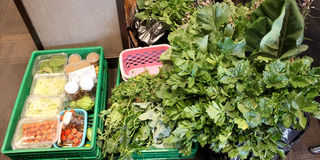Popularising traditional vegetables in Kenya: Experts say they are key to building agricultural and food system resilience
Sponsored by AGRA

Traditional fruits and vegetables on display during an African Indigenous Vegetables (AIVs) conference held in Nairobi in 2019.
While the lockdowns and border closures associated with the Covid-19 pandemic halted the importation of food items, the period also served to reintroduce consumers to healthy traditional African foods. This is according to Prof Ruth Oniang’o, the founder of the non-profit Rural Outreach Africa, who observed an increase in the demand for such items as arrow roots, sweet potatoes and cassava during the lockdown.
“We went back to our own foods. People were looking around for their traditional foods, which were even making their way into supermarkets,” said Professor Oniang’o during a Farmers’ Forum on resilience in food systems, organised by the Alliance for a Green Revolution in Africa (AGRA) on August 12, 2021.
Prof Oniang’o, however, expressed the concern that the gains for Africa’s food and agricultural systems were short-lived because markets resorted to the popular exotic food once the lockdowns were lifted.
The traditional African foods that Prof Onyango advocates for are important for both nutritional and biodiversity benefits. A project on resilience by AGRA found that training farmers to increase the production of marketable traditional African vegetables (TAVs) like Managu (black nightshade), Terere (amaranth), and Mrenda (jute mallow) helped reduce the loss of biodiversity in Kakamega Forest.
The project was initiated after research showed that communities neighbouring the forest were gradually seeking new lands for cultivation after their old ones were drained off the nutrients required to sustain the production of regional staples, maize and beans.
In addition, other farmers, unable to make meaningful harvests from their lands, started raiding the forest for herbs, like the popular local aphrodisiac, Mukhombero, firewood and timber, for sale in markets, to supplement their dwindling agricultural incomes.
However, a reduction in the forest’s destruction was reported after farmers in the area were taught how to plan and maintain their cultivation of TAVs in line with market demand, for increased incomes.
So far, the project has been a success with targeted farmer incomes reporting a 17 percent increase since 2017.
“Additionally, as a result of the improved financial bearing for the farming communities, there is evidence of agroecological landscapes being restored,” said John Macharia, AGRA’s lead programme officer for Kenya, Uganda and Rwanda.
Evelyn Imasia is one such beneficiary, whose life has been transformed after she doubled her production of TAVs. Today, Imasia can adequately cater for her family’s needs through her income from TAV sales, which has increased to Ksh50,000 in three growing seasons, up from Ksh7,500 over a similar period previously. “I can now comfortably feed and educate my children from my vegetable sales,” Imasia testified.
The promotion of TAVs in Western Kenya is just one of the many strategies that can be used to promote resilience in Kenya’s agricultural and food systems. Others include interventions that increase the nutritional output of depleted soils, irrigation, and the development of steadfast market linkages.
For market development, Prof Joshua Ogendo, an associate professor of agriculture at Egerton University, said the Kenyan government needs to review its agricultural policies to favour local smallholder producers. Citing the grains market, Prof Ogendo said the high costs of production accrued from taxes on agricultural inputs, make Kenyan farmers unable to compete with their peers in Uganda and Tanzania, who produce at lower costs.
“You can see a lot of grains getting into Kenya from Tanzania and Uganda, which shows you that those two countries have policies that make production cost-effective, therefore giving them a comparative advantage over Kenya,” he explained.
Prof Ogembo was one of the panellists at the Farmers’ Forum, which according to AGRA, was designed to give agricultural stakeholders a chance to contribute ideas for quickening the pace to Africa’s agricultural transformation.
The Forum served to address farmers’ priorities for increasing agricultural output and strategies for transforming their agricultural work into sustainable businesses that will eradicate poverty from the continent.


